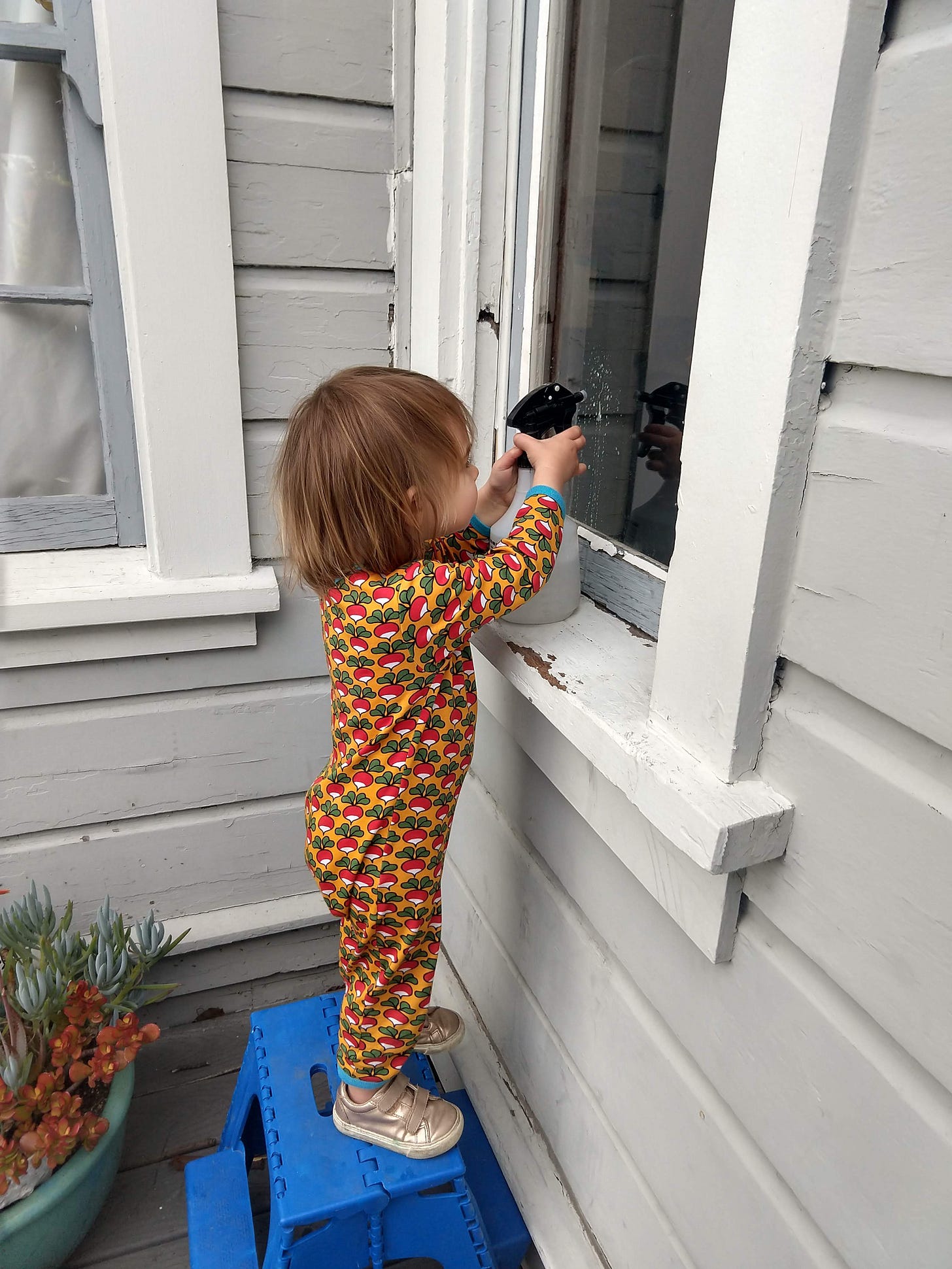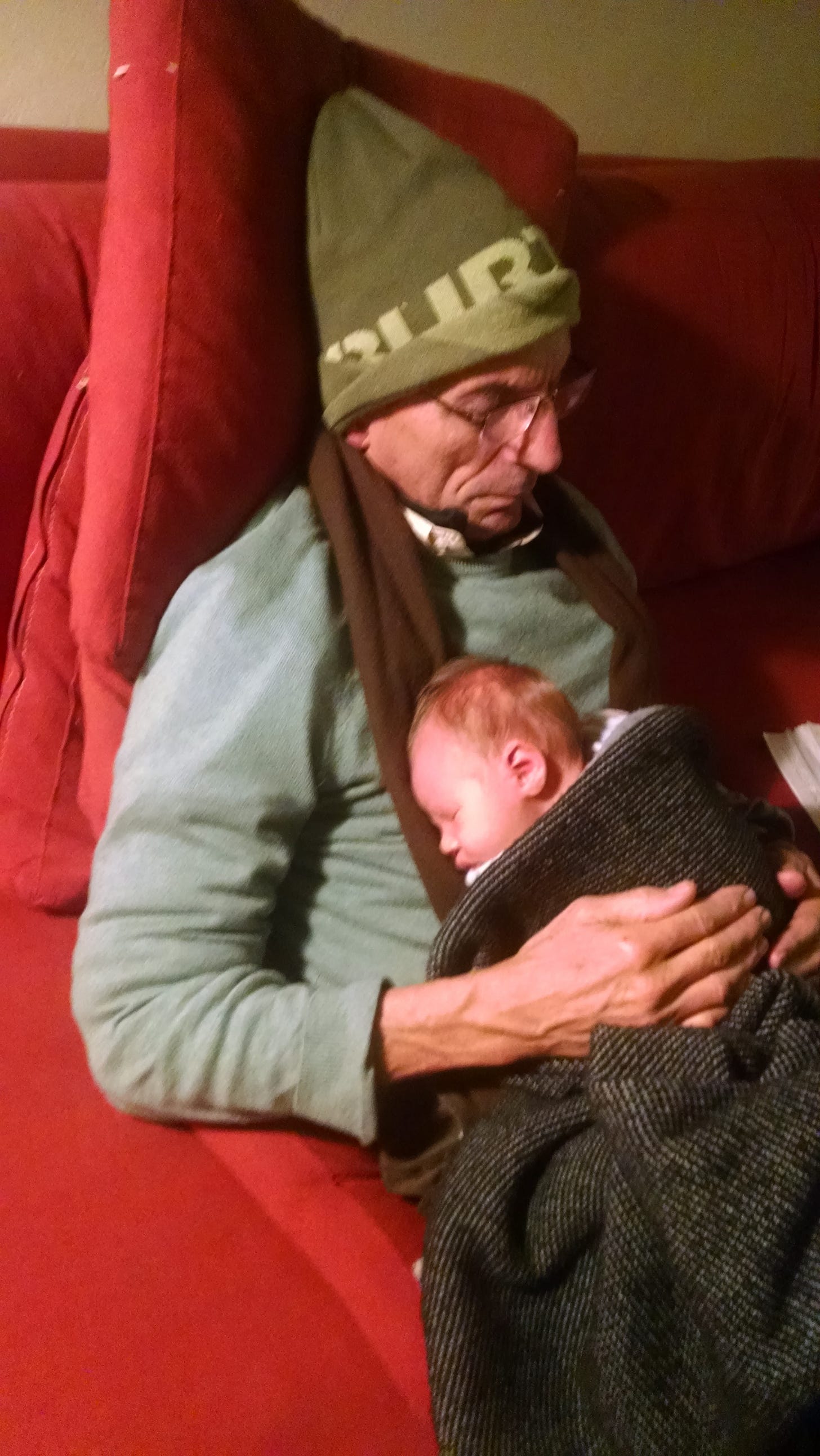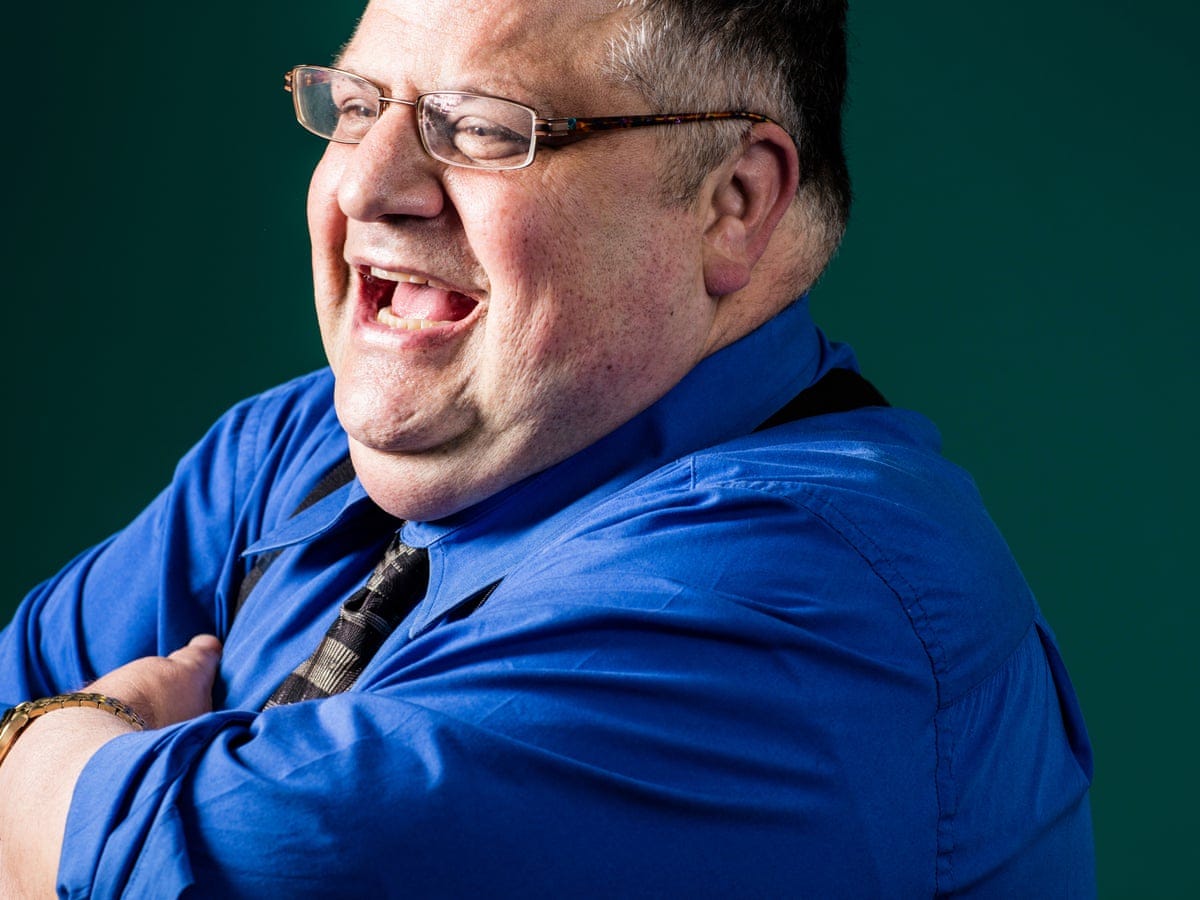I had a dream the other night that someone posted online “What are your favorite newsletters that have completed ghosted you?” In the comments, mine was repeatedly mentioned. The “favorite” part must have been my subconscious giving me a little much-needed bravado. The ghosting, clearly, was about how delinquent I’ve been here of late. I woke up convinced it was real (see the bravado???!) and determined to stop avoiding writing about a topic that still feels quite unresolved.
I didn’t ghost you, friends. I MOVED. New house, who dis. After FIFTEEN YEARS in our rent-controlled Oakland apartment, which was in the middle of literally everything, we bought a house a few blocks away, in what we have been referring to as “the suburbs” because, if you came from the MIDDLE OF LITERALLY EVERYTHING, it feels relatively quiet.
I adored our apartment. I moved there as a twenty-six year-old grad student. We had a backyard with lemon trees and a gas fireplace where I wrote my master’s thesis at a TV table, covered in blankets and a winter hat (not just our summers are cold!). Then, we had a lot of room for two people. We had killer parties - for Chanukah and birthdays and our anniversary, which we called Wheeler-Korn Day. We brought home a baby, then another. We discovered a door in the driveway that led, like the Secret Garden, to a cohousing community that became our chosen family. We sheltered in place — turning the dining room table into the art table and the backyard into a daycare and the parked car in the driveway into a therapist’s office and everything into a combination of panic and a suffocating, sometimes deliciously protective love.
If you know me or have been reading my work, you know that I like to side-eye pretty much everything, particularly when it comes to how we should be raising our children, how we are supposed to be families. Space is no exception. I felt vindicated by Amil Niazi’s wonderful essay on why she doesn’t need a second car or bigger home just because she had a third kid. “That extra bedroom, roomier car, and pricey stroller won’t change the real work of caring for a child, don’t let anyone tell you otherwise,” Niazi writes.
To me, the four walls that held us weren’t the main idea of who we were. We were the community, our neighbors, our “third spaces” (shout out to the local game store!) Wanting more space — a room that was not a closet for my daughter, a bathroom that everyone didn’t have to walk through our bedroom to get to, with a door that never closed — felt like wanting to put a bow in my baby daughter’s hair or send my kids to Kumon or only let them eat organic. It was a form of optimization, of buying into our culture’s vibe of there always being room for an upgrade. Also, like those things, it was mostly, I thought about me.
There is this coffee grinder, at the little house by the beach that my stepfather’s family has owned since the 40s. It has been so well-loved that the only way to get it to work is to stick a toothpick down into the hole that connects the lid from the base, just so, when you want it to grind. We make coffee, for the many people that clown-car their bodies into this beach house, every morning. When my siblings and I offered to order a new one, my parents balked. “It’s like, twenty bucks mom!” we scolded. They were almost disturbed by the idea of us replacing the janky coffee grinder. To us, groping around in the knife door for a toothpick, bleary-eyed at 7am, was annoying. To them, I think, the coffee grinder worked, in no small part due to their ingenuity. Why would you want to throw that away?
With two children, getting larger by the day, often clawing at each other physically or emotionally in the big room that made up most of our floor plan, our apartment started to feel like that coffee grinder. It was old, and sweet, and we made it work, goddamnit! Making it work was, I realized, my identity. I prided myself on my little scrappy apartment, it represented a resistance to the “nuclear-family first” culture that so thoroughly f’ed us all.
Over the years each little solution (Erect a tent in the living room so my daughter had somewhere to play! Put a training potty in her bedroom so she didn’t wake us up nine times a night! Make an office out of a shelf and remove the pillows on the bed behind it before every Zoom!) felt like victory, but they also felt inadequate. There are only so many toothpicks you can stuff into a small hole that was designed for a metal spring.
I’m almost embarrassed to tell you how much I love this new house. It has bathrooms. Plural. It has a kids’ floor. For now, my office is a stack of cardboard boxes, but in theory, a real one will materialize soon.
When I work with classroom teachers on serving neurodivergent students, we always start with the physical environment. It turns out everyone responds to their environment, and changes to the environment change our behavior. My kids still fight way more than I’d like them to, but they are weirdly getting along more in this space. They are sleeping better. But it’s also for me. I am all the things I have been casting shade on — someone who loves space, and nice appliances, and the right storage containers (so much plastic!), someone who needs a separate room for each of her children. It turns out my nuclear family wanted a little bit more attention. I feel guilty for all of this need and want and expense and maybe, waste? And also very, very happy.
When I was agonizing over quitting a job I’d long hated, my therapist once said to me, “Yes you could stay, but you don’t want to.” But many of us, mothers especially, don’t spend a lot of time in the “want to.” I want to be here. But I still hold a candle for the scrappy days.
Goodbye apartment. And the elbow-grease fantasy that, like my mother before me, I would be able to manage a bunch of kids in shared bedrooms and one bathroom, which, I still maintain, was character-building. Goodbye always knowing what my kids are doing or saying, hearing all of their singing and farting. Goodbye no privacy, you had your sweet moments.
But hey, talk to me a week from now. I bed both my kids will be sleeping in my bed.
Also this:
A few weeks ago, on my 41st birthday, the journalist Steve Silberman died. His book, NeuroTribes: The Legacy of Autism and the Future of Neurodiversity, is responsible for much of my own personal mind-shift around neurodiversity and what it means to be disabled in an ableist world. If you haven’t read it, it’s a fascinating delight. And you can always start with his Ted Talk, which I assign to my student-teachers every year.
The Autistic Self-Advocacy Network publicly mourned the loss. A writer for the PayDay Report had this to say about Steve: “He was a real mensch, a hysterical guy and a big supporter. I can’t tell you how many times I received positive messages from him about articles or just retweets. (Until Steve deleted Twitter in protest of Elon Musk – he was always a principled person).
Steve was like a lighthouse in a storm for so many autistics. A source of comfort, insight, and support in a very overwhelming world for many of us. May Steve’s memory always be a memory to marginalized people everywhere looking to build community.”
I’ll leave you with a few of my favorite quotes to remember Steve by.
“By autistic standards, the “normal” brain is easily distractible, is obsessively social, and suffers from a deficit of attention to detail and routine. Thus people on the spectrum experience the neurotypical world as relentlessly unpredictable and chaotic, perpetually turned up too loud, and full of people who have little respect for personal space.”
― Steve Silberman, NeuroTribes: The Legacy of Autism and the Future of Neurodiversity
“Not all the features of atypical human operating systems are bugs.”
― Steve Silberman, NeuroTribes: The Legacy of Autism and the Future of Neurodiversity
Rest in peace Steve.









I feel this all so hard. Thank you for writing it.
As a NYC native, I was a longtime (I once thought lifelong) tiny-home dweller. Even when we moved north to Westchester, we lived in a cozy 2BR apartment…even once we got to three kids. Now, we live in a house that is giant for our village, though (I tell myself) definitely considered “midsize” by current suburban standards overall. I feel shame at times over the size of this house, like it says something about me. But the reality is, with four kids, and one parent who works quite a lot from home in very space-intensive ways (construction/architectural drawings, etc), it just….works so well for us. The younger kids still fight seemingly nonstop, but each of them having their own bedrooms to retreat to is an invaluable investment in my own sanity. Having a living room with enough space to roll a yoga mat out and do some morning stretches (without having to move furniture) is heaven. Having a playroom where all errant toys can go, even if they are just waiting on the floor until we do a clean-up, is life-changing. Having a backyard that, for all its faults, has room for a trampoline and some portable soccer goals and a small garden – it's not a “need,” but it definitely DOES make life easier. We went through the pandemic with a preschooler and a toddler and no backyard, and maybe I was just scarred by that experience, but my love of our current house is far greater than my guilt/shame over its size.
This was beautitful, Sarah.
And rest in peace, Steve. His book changed so much of how I understood neurodiversity and really flipped a lot of what my training had taught me, he really was an amazing human.